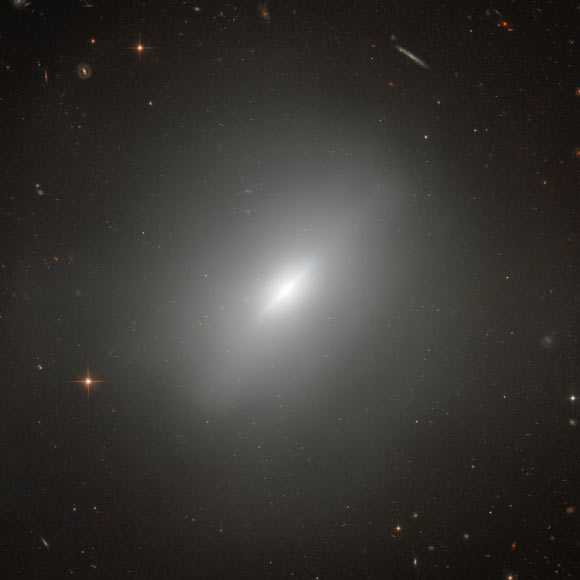Astronomers using the NASA/ESA Hubble Space Telescope have obtained a remarkable new view of a galaxy known as NGC 3610.

This dramatic image shows the Hubble’s view of a dynamically young lenticular galaxy known as NGC 3610, which lies 72 million light-years away. Image credit: NASA / ESA / Hubble / Judy Schmidt, www.geckzilla.com.
NGC 3610, also known as LEDA 34566 or UGC 6319, is a peculiar lenticular galaxy located in the constellation Ursa Major.
It is approximately 72 million light-years distant and is about 85,000 light-years across.
The galaxy was first discovered by the English astronomer William Herschel on April 8, 1793.
For a long time NGC 3610 was thought to be an elliptical galaxy, but in 1990 a team of astronomers in Germany detected a disk in the galaxy. This was a surprising discovery as disks are normally a distinguish feature of spiral galaxies.
The reason for the peculiar shape of this galaxy stems from its formation history. When galaxies form, they usually resemble our own Milky Way Galaxy, with flat discs and spiral arms where star formation rates are high and which are therefore very bright.
NGC 3610 is a much more disordered object which results from the merging of two or more disc galaxies.
During these mergers most of the internal structure of the original galaxies is destroyed.
The fact that NGC 3610 still shows some structure in the form of a bright disc implies that it formed only a short time ago – around 4 billion years ago.
Almost every bright dot in this Hubble image is a galaxy – the few foreground stars are clearly distinguishable due to the diffraction spikes that overlay their images.
Astronomer Judy Schmidt submitted a version of the image to the Hubble’s Hidden Treasures image processing competition.







